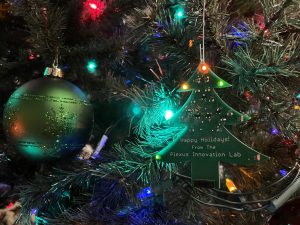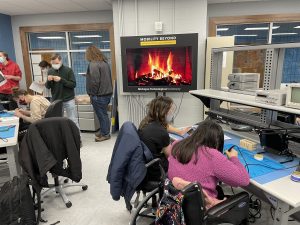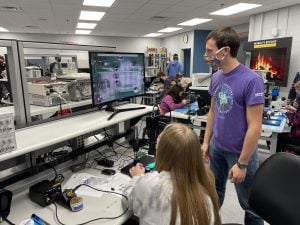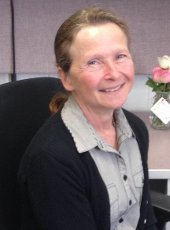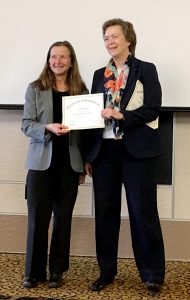Participants gathered in the Plexus Innovation Lab late last week to create Christmas tree ornaments, an event sponsored by the IPC & Electronics Student Chapter at Michigan Tech with some help from the Blue Marble Security Enterprise. Pictured are students creating their ornaments using the pick and place machines within the lab, and others optically inspecting the boards’ soldered connections to detect and identify defects. https://www.involvement.mtu.edu/organization/ipc-electronics
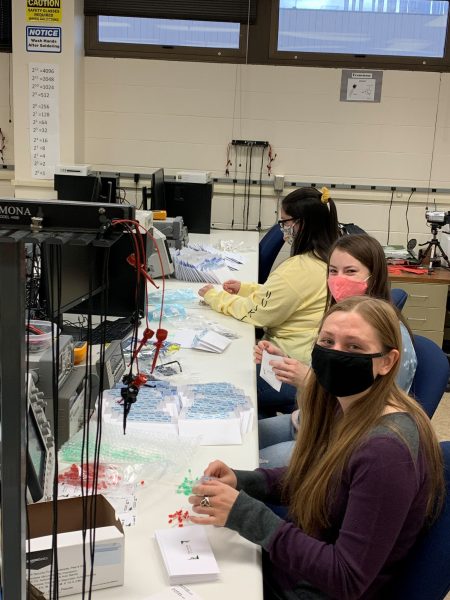
On a Mission to Make Hundreds of Outreach Kits, ECE Hosts Work Bees
by Liz Fujita
On multiple evenings in October, the lab space in EERC 722 was the image of organized chaos. Bags of LEDs, resistors, capacitors, switches, and batteries spilled out on lab benches, waiting to be counted out into bags. Soldering irons heated up, fume-extracting fans whirring. Empty boxes steadily filled with kits ready to bring to pre-college students. With 600 hands-on outreach kits to prepare, the Department of Electrical and Computer Engineering has been hard at work this fall with the help of phenomenal student volunteers, and there is still plenty more to go.
Interim chair Dr. Glen Archer is the PI on a grant from the Michigan Space Grant Consortium (MSGC) for the 2020-21 academic year that focuses on getting electrical engineering projects out to pre-college students at multiple levels. Along with co-PI Dr. Gretchen Hein (MMET) and academic advisor Liz Fujita (ECE), the program centers on multiple layers of mentorship.
“It’s an ambitious idea,” says Fujita, who in addition to advising helps to coordinate outreach efforts in the ECE department. “Michigan Tech has a lot of successful outreach programs that rely on this idea of near-peer mentoring—that idea that college students presenting information is more engaging, cooler, and better-received by high school students.” The MSGC proposal calls for several layers of near-peer mentoring to take place at several schools:
College students teach high school students how to solder and the basics of electronic components with the heart rate monitor boards.
Under the guidance of those college mentors, the high school students teach middle school students similar skills on the (slightly easier) tree circuit boards.
And, lastly, the middle schoolers take bouncy bot kits to their elementary school to teach 4th and 5th graders the basics of circuits.
All of this requires a tremendous amount of preparation. In October alone, members of Blue Marble Security Enterprise and the Society of Women Engineers spent a combined 50+ hours soldering, counting, stuffing bags, and organizing materials.
ECE has on multiple occasions joined forces with the Society for Women Engineers. Funding for this project includes support for not only the activity kits themselves (circuit boards, LEDs, resistors, batteries, etc.), but also for soldering stations, storage bins, and travel to schools in the local area as well as downstate. The combined funding secured by SWE and ECE will enable them to prepare 200 of each activity kit.
Notes Archer, “Near-peer mentoring allows younger students to picture themselves in a future state. They see this person in front of them and imagine their own life, in that role.” Although current COVID-19 restrictions leave the group unsure of when they will be able to visit schools, they remain optimistic. And, as work bees continue, they will be more than ready!
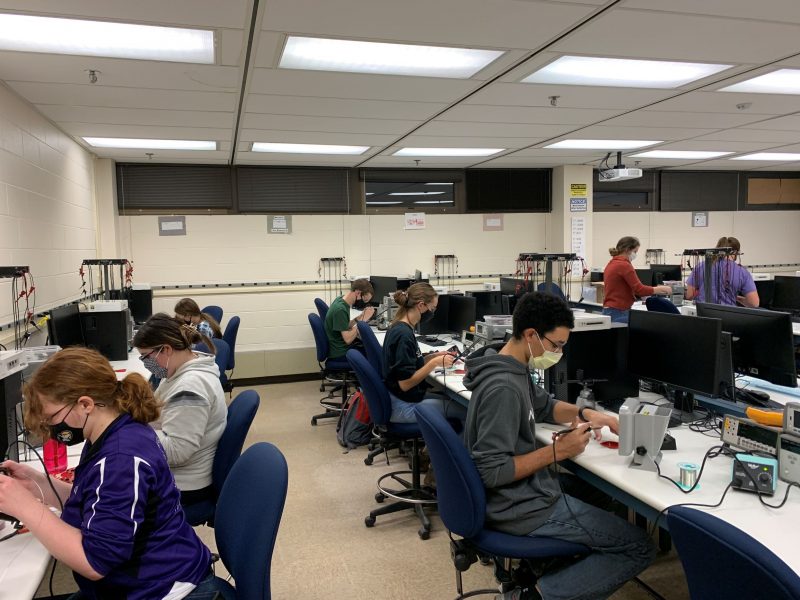
A new scholarship at Michigan Tech is expected to advance the study of optics and photonics. The Optics and Photonics Scholarship was set up this past year by Michigan Tech Electrical and Computer Engineering alumnus Eustace Dereniak (‘63). Dereniak is a retired Professor and Professor Emeritus of Optical Sciences and Electrical and Computer Engineering at the University of Arizona, Tucson, AZ. He is also a past President of the International Society for Optics and Photonics (SPIE).
Chris Middlebrook, Associate Professor of Electrical and Computer Engineering at Michigan Tech, states that “The establishment of the Optics and Photonics Scholarship for undergraduate ECE students or other engineering students is a huge first step in the future direction of optical research and development at MTU.”
Photonics, the manipulation of light (photons), has revolutionized medical imaging, autonomous vehicles, solar power, optical computers, space optics and 3D printing. Photonics is poised to become the key technology of the future, surpassing electronics with new engineering challenges for the 21st Century. A photon velocity is about 1000 times faster than electron velocity. Dereniak said, “My goal in establishing this scholarship is to motivate Michigan Tech’s engineering students to become hooked on optics as they investigate Michigan Tech’s optics/photonics curriculum and the unique career opportunities that exist within this rapidly growing field.”
SPIE has offered to match dollar-for-dollar any contributions to the scholarship fund, up to $60,000. Any person or organization that would like to contribute to the scholarship can do so by making a check payable to “Michigan Tech Fund #5392.” They may also contribute online at https://www.mtu.edu/givenow/?code=GIV0 (be sure to specify fund #5392).
April 11th is Michigan Tech’s first 24-Hour Giving Challenge! Support your favorite area of campus by making a gift of any amount! There are so many opportunities throughout the day to have our gifts matched along with additional funds from generous donors. Leroy Keranen ’61 has generously agreed to donate $25,000 to the robotics engineering fund if 25 people donate any amount. Simply go to www.give.mtu.edu and click on the Robotics Engineering campaign. #goldblackgiveback
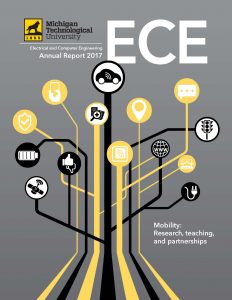 We are happy to share with you our newly released ECE Annual Report 2017. A look back at our past year highlights research activities from nine of our faculty members in the area of mobility, along with graduate students Mojtaba Bahramgiri, Derek Chopp, and Mehdi Jafari. We share in the good news received during the year in which three of our assistant professors received major early career awards: Lucia Gauchia and Zhaohui Wang received National Science Foundation CAREER awards and Jeremy Bos received the US Air Force Young Investigator Program award. We highlight two of our many outstanding undergraduate students, Brian Flanagan and Casey Strom, for accomplishments and contributions during their BS degree studies. This May we celebrated the 50th anniversary of the first female graduate of the Michigan Tech EE department, Pat Anthony. Pat was honored by the University during spring commencement and was also inducted into the ECE Academy. Once again the year included a wide variety of hands-on student projects in our Senior Design and Enterprise programs and we thank our sponsors for making it all possible! We invite you to read about these stories and more. From all of us at ECE, happy holidays and best wishes for 2018!
We are happy to share with you our newly released ECE Annual Report 2017. A look back at our past year highlights research activities from nine of our faculty members in the area of mobility, along with graduate students Mojtaba Bahramgiri, Derek Chopp, and Mehdi Jafari. We share in the good news received during the year in which three of our assistant professors received major early career awards: Lucia Gauchia and Zhaohui Wang received National Science Foundation CAREER awards and Jeremy Bos received the US Air Force Young Investigator Program award. We highlight two of our many outstanding undergraduate students, Brian Flanagan and Casey Strom, for accomplishments and contributions during their BS degree studies. This May we celebrated the 50th anniversary of the first female graduate of the Michigan Tech EE department, Pat Anthony. Pat was honored by the University during spring commencement and was also inducted into the ECE Academy. Once again the year included a wide variety of hands-on student projects in our Senior Design and Enterprise programs and we thank our sponsors for making it all possible! We invite you to read about these stories and more. From all of us at ECE, happy holidays and best wishes for 2018!
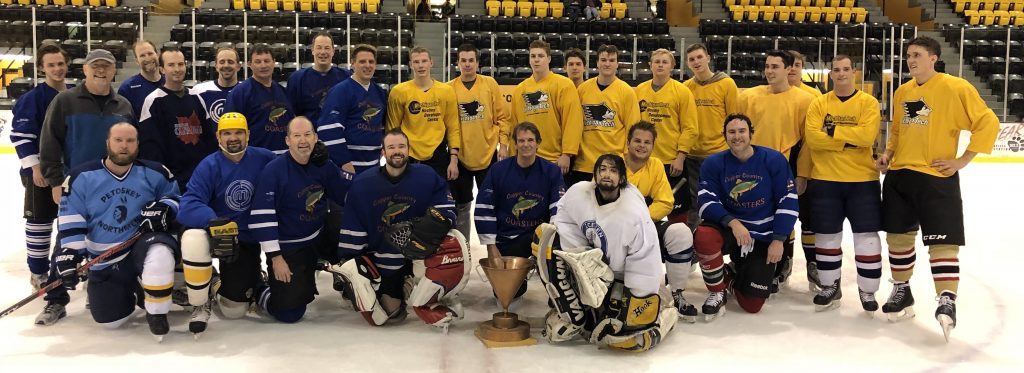 The faculty pulled out a thrilling 12-10 come-from-behind overtime victory in the 2017 edition of the annual ECE student-faculty hockey game, held at the MacInnes Ice Arena on Saturday, December 2. Both sides showed energy and enthusiasm in the first period, with goals see-sawing back and forth to a score of 5-4 with students in the lead at the end of the period. The defenses stepped it up in the second period, with only one goal scored mid-period by the faculty to even things up at 5-5, until the students scored two quick goals in the last 30 seconds to go ahead 7-5. In the last period, both sides battled to 10-8 with students on top with two minutes to go. The faculty pulled the goalie and scored two more goals to tie it up 10-10 with just seconds remaining. The game went to a 5-round shootout, which the faculty took in four rounds 2-0, for a final score of 12-10. Special mention goes to Mark Maroste for scoring two goals in regulation and one in the shootout, to Adam Webb for a hat trick in regulation and for the second and winning shootout goal, and to faculty goalie Brian Hutzler for turning away roughly 100 shots and shutting out the students in overtime.
The faculty pulled out a thrilling 12-10 come-from-behind overtime victory in the 2017 edition of the annual ECE student-faculty hockey game, held at the MacInnes Ice Arena on Saturday, December 2. Both sides showed energy and enthusiasm in the first period, with goals see-sawing back and forth to a score of 5-4 with students in the lead at the end of the period. The defenses stepped it up in the second period, with only one goal scored mid-period by the faculty to even things up at 5-5, until the students scored two quick goals in the last 30 seconds to go ahead 7-5. In the last period, both sides battled to 10-8 with students on top with two minutes to go. The faculty pulled the goalie and scored two more goals to tie it up 10-10 with just seconds remaining. The game went to a 5-round shootout, which the faculty took in four rounds 2-0, for a final score of 12-10. Special mention goes to Mark Maroste for scoring two goals in regulation and one in the shootout, to Adam Webb for a hat trick in regulation and for the second and winning shootout goal, and to faculty goalie Brian Hutzler for turning away roughly 100 shots and shutting out the students in overtime.
The game was enjoyed by the largest crowd ever to attend the annual department event, and the same crowd enjoyed numerous door prizes and pizza after the game. A good time was had by all, and many of the aging faculty players could still walk after it was all over.
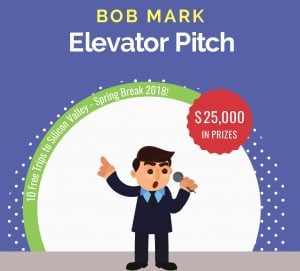 EE major Cameron Philo received “Best Green Innovation” at the 2017 Bob Mark Elevator Pitch Competition held Saturday in the Van Pelt and Opie Library.
EE major Cameron Philo received “Best Green Innovation” at the 2017 Bob Mark Elevator Pitch Competition held Saturday in the Van Pelt and Opie Library.
Philo was selected for his “3D Windmill,” a unique compact windmill design to bring electricity to underdeveloped regions. Along with the $250 cash prize, Philo will join the other 10 award recipients in Silicon Valley during Spring Break 2018.
For a complete list of prize winners see Tech Today.
Michigan Tech’s new Lean facilitators were recognized April 11, 2017. These new facilitators completed a six-month training program with classroom learning and work-related projects. They received in-depth training on team building, conflict management, organizational change, facilitating techniques and Lean methods and tools. They are now ready to join the current Lean facilitators and will spread continuous improvement using Lean thinking across the University.
Among the graduates is Joan Becker, ECE Graduate Program Coordinator.
For more information about the Lean facilitator training, contact improvement@mtu.edu.
Original story by the Office of Continuous Improvement.
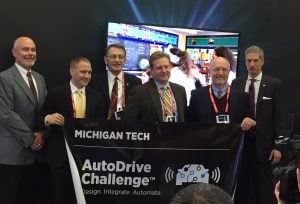 It has definitely not been a quiet week in Houghton. Some pretty exciting news in the ECE Department was made public, and I will share that with you shortly below. There was also some bittersweet news for the entire university, and I think it best if I lead with that. This past Wednesday, two days ago, our university president Glenn Mroz announced in an e-mail to the campus community that he was stepping down as president and returning to the ranks of the faculty, effective June 30, 2018. That date is over a year away, so there is plenty of time for an orderly transition in the administration, and also plenty of time for reflections and best wishes which I am certain will be ample as the date approaches. President Mroz has worked tirelessly on behalf of Michigan Tech and is much loved by the university community. The institution has made some important strides forward under his leadership. I will leave it at that (for now), and just add that we have an interesting year ahead of us.
It has definitely not been a quiet week in Houghton. Some pretty exciting news in the ECE Department was made public, and I will share that with you shortly below. There was also some bittersweet news for the entire university, and I think it best if I lead with that. This past Wednesday, two days ago, our university president Glenn Mroz announced in an e-mail to the campus community that he was stepping down as president and returning to the ranks of the faculty, effective June 30, 2018. That date is over a year away, so there is plenty of time for an orderly transition in the administration, and also plenty of time for reflections and best wishes which I am certain will be ample as the date approaches. President Mroz has worked tirelessly on behalf of Michigan Tech and is much loved by the university community. The institution has made some important strides forward under his leadership. I will leave it at that (for now), and just add that we have an interesting year ahead of us.
Now on to the good news. On Wednesday it was announced that Michigan Tech is one of 8 universities in North America selected to participate in the GM/SAE AutoDrive Challenge. This is a collegiate competition, jointly sponsored by General Motors (GM) and the Society of Automotive Engineers (SAE), with the goal of having students design, build, and test a fully autonomous vehicle. The students will take an existing vehicle – a Chevy Bolt, donated as part of GM’s sponsorship – and outfit it with sensors, processing, and control strategies to make it autonomous, over a period of three years. It is an ambitious project, with an ambitious goal, and I couldn’t be happier that we will be a part of it.
There was a competition just to get into the competition. The Michigan Tech team that prepared the winning proposal was led by Prof. Jeremy Bos of the ECE Department, who worked closely with Prof. Darrell Robinette of the Department of Mechanical Engineering-Engineering Mechanics. There was also close cooperation with Rick Berkey of the Pavlis Honors College, who is responsible for much of the oversight of the Michigan Tech’s signature Enterprise Program. The reason behind the Pavlis participation is that the competition activity will take place in the Robotic Systems Enterprise, which is hosted in the ECE Department but which includes membership from other parts of campus, most notably ME-EM and Computer Science. Next year Prof. Bos will take over as faculty advisor for the Robotic Systems Enterprise, and AutoDrive will comprise a major portion of his teaching assignment.
The announcement was made on Wednesday with much fanfare at the SAE World Congress, a large technical conference and exposition for automotive engineers held at CoBo Hall in downtown Detroit. There was a big lunch for all the winning teams and then a ceremony, with speeches by representatives of GM and SAE and announcements of the winning teams with plenty of photo opportunities, for ourselves and for the press. It was a wonderful moment. SAE was extraordinarily generous with us and the other teams, paying for all the travel expenses to attend the conference and particularly the announcement event. There were four us on hand – Jeremy, Darrell, ME-EM chair Bill Predebon, and me.
We had a chance to meet the other teams; they are:
Kettering University
Michigan State University
University of Toronto
University of Waterloo
North Carolina A&T State University
Texas A&M University
Virginia Tech
I have a lot of respect for these other institutions and I know the competition will be stiff. I welcome the opportunity to see how Michigan Tech stacks up.
I am excited about this turn of events for several reasons. First off, I have been advocating for the past year or so for the ECE Department to have a larger footprint in the areas of the robotics, control, and automation. A lot has been coming together in this regard, e.g. the growth of the Robotic Systems Enterprise, some changes to the curriculum, and development of our research programs, but this may very well become our most visible activity in the area. I have to add, this is not just about ECE: it will be a team effort involving ECE, ME-EM, and CS. This is a great opportunity for these three units to show what can accomplished when we break down the silos a little bit and work toward a common goal. In doing this we will meet another objective of mine, which is to ensure that our work is beneficial to the state of Michigan and the larger Great Lakes region. I see a renaissance in the state that is driven in part by the development of new technologies surrounding the “mobility” area, which leverages the considerable engineering talent that already exists here. Engineers who can cross disciplinary boundaries among ME, EE, and CS are needed to keep this movement vital. I want Michigan Tech to be known as an institution that is doing its part for the economic growth and revitalization of the region, through both our research and through educational programs that meet the state’s workforce needs.
I also believe a program like the GM/SAE AutoDrive Challenge will do a lot to stir the imagination of new and prospective students at Michigan Tech. A lot of high school students that come to campus have experience in FIRST Robotics, and when they visit us the first thing they want to know is, what do we have going in robotics? Do we ever have an answer now: how would you like to be part of a team building a fully autonomous vehicle? The aspiring engineers in FIRST Robotics – and just yesterday I met a very capable and enthusiastic team at the Macomb Academy of Arts and Sciences, in Armada, Michigan – have the passion and the drive to see this project through to a successful conclusion as they mature as college students. I predict we are going to see another jump in enrollment in ECE and ME-EM as word of this competition gets around.
We see a lot in the popular press these days about autonomous vehicles and how quickly the technology is developing. I think this is the “moon shot” for the current generation. We may not know how we are going to get there, but it is pretty clear that we are going to get there one way or another. In analogy with the original moon shot in the 1960s and 1970s, this effort may be more valuable for new spin-off technologies that result than it is for the stated goal. If you think about it, what did we really accomplish in 1969? We put some men on the moon, they drove around in buggies, and collected some rocks – big deal. What was really launched in the NASA lunar missions was an entire electronics and computing industry, with far-reaching consequences leading right to present day and far beyond. The same may happen with autonomous vehicles, as entirely new paradigms for sensing, processing, and artificial intelligence give rise to new life-altering technologies that we cannot even imagine today.
When President Mroz issued his open letter to the campus community on Wednesday, he included this critically important statement: “I have no intention of allowing Michigan Tech to lose its forward momentum.” The AutoDrive Challenge is a perfect example of that forward momentum. There may be transitions and uncertainty in the university’s future, just as in the landscape of mobility technologies, but that is no reason to look to the future with anything less than optimism and a sense of wonder about the possible. I wish our AutoDrive team all the best of luck, and will do everything I can to support them. Game on!
– Dan
Daniel R. Fuhrmann
Dave House Professor and Chair
Department of Electrical and Computer Engineering
Michigan Technological University
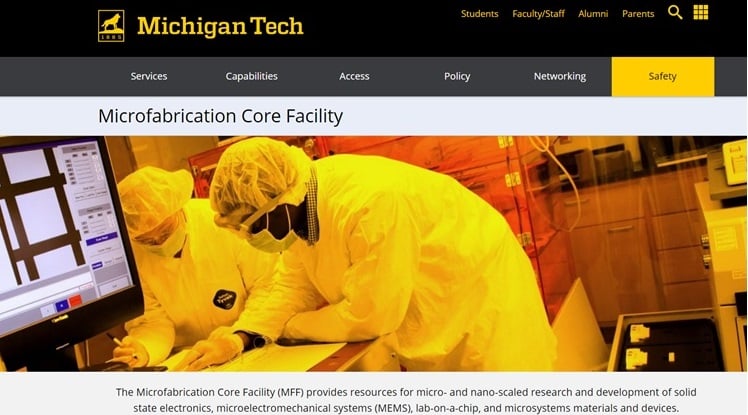 Michigan Tech’s Microfabrication Facility, housed under the Department of Electrical and Computer, has launched its new website mtu.edu/microfabrication.
Michigan Tech’s Microfabrication Facility, housed under the Department of Electrical and Computer, has launched its new website mtu.edu/microfabrication.
The Microfabrication Facility (MFF) consists of thin film, plasma etching, photolithography, and temperature processing equipment. MFF capabilities are broad and applicable to areas of biomedical engineering, chemistry, chemical engineering, electrical engineering, physics, materials science, and mechanical engineering. Deposition, sputtering, etching, and photolithography capabilities together with microcharacterization measurement systems enable precision device engineering.
The new site enables users to schedule reservations and check the live status of the MFF equipment, along with other user friendly features. 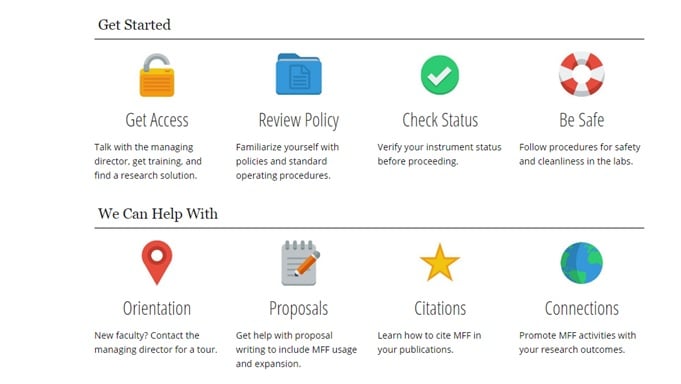
The MFF was also recently selected as a member of the Northern Nano Lab Alliance (NNLA), a regional network of university fabrication facilities. The mission of the NNLA is to help each member improve their support of academic research in applied nanotechnology.
MFF managing director Chito Kendrick, PhD, says “Being a member of the NNLA allows for a partnership with some of the local regional universities that have similar nano/micro fabrication facilities, and will indirectly expose Michigan Tech to the National Nanotechnology Coordinated Infrastructure (NNCI), which has replaced the National Nanotechnology Infrastructure Network (NNIN). This opens up availability to systems that are currently not provided by the MFF. The partnership will also benefit the MFF staff with access to technical support and loaning equipment from the other groups; also we are exploring ways to reduce the operational costs of these facilities.”
